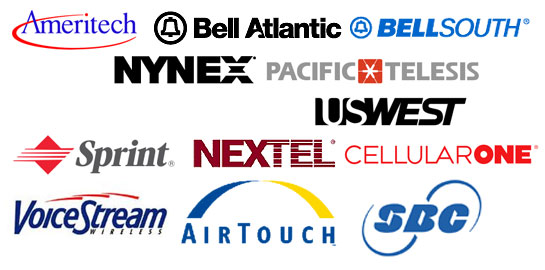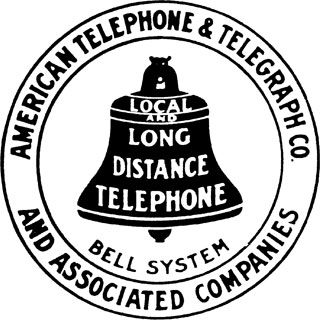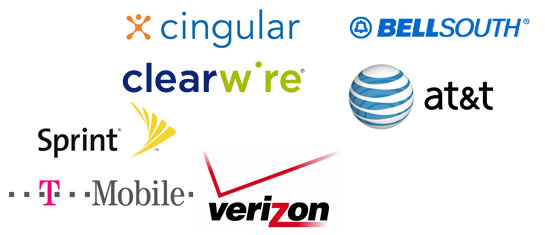A Brief History of the Rise and Fall of Telephone Competition in the US, 1982-2011
By Harry McCracken | Sunday, March 20, 2011 at 11:06 pm
So much for quiet Sundays. AT&T announced today that it’s agreed to acquire T-Mobile US from Deutsche Telekom, a merger which, if completed, will make it by far the country’s biggest wireless phone company. It’ll also leave us with three national carriers: AT&T, archrival Verizon Wireless, and the much smaller Sprint.
I’m not an expert on the dynamics of the telecommunications industry, but Om Malik’s thoughts–that this is bad news for everybody except AT&T and T-Mobile shareholders–do a good job of summarizing the pessimistic view I’m instinctively inclined to tak. In the US, T-Mobile was a scrappy underdog that did shocking things like reduce monthly bills once a customer had completed a contract for a subsidized phone. It’s tough to imagine that T-Mobile’s personality will rub off on AT&T rather than the other way around.
Of course, AT&T does its best to make the case that this is good news: If the merger goes through, it will have more wireless spectrum to work with, and says it will bring LTE to former T-Mobile customers. And the company argues both that (A) there’s still plenty of competition, between national and regional wireless companies, and (B) past mergers have been good for consumers. Which is, I guess, the argument you’d expect from a company named AT&T.
Now that it looks like the US will be left with only three national wireless phone carriers, my mind wandered back to the early 1980s, when the original AT&T monopoly was broken up by the Department of Justice. It was a different era–one in which nobody owned a cellular phone and everybody paid through the nose for long-distance service. (Fast forward to 2011: Almost everybody has a cell phone, and long distance is a freebie.) But the theory back then was that more phone companies would be better for consumers than fewer phone companies.
I knew what happened in the years since: New phone companies did spring up, but an endless parade of mergers led to much of the original AT&T merger being reconstructed into two behemoths: AT&T (which is really the descendant of Southwestern Bell) and Verizon (once Bell Atlantic). I’d forgotten about almost all the details, though, and today’s news prompted me to go back and remember what happened when. It seemed worth recording here.
You can quibble with my accounting of things, and probably will–and that’s fine. I don’t even mention MCI or WorldCom until 1997, for instance, and some of the logos aren’t the correct ones for the years in question. There are a bunch of companies I don’t mention at all, such as Alltel and Omnipoint. And I don’t cover “Mobile Virtual Network Operators” such as Virgin Wireless (acquired by Sprint in 2009) or regional players such as Cricket and MetroPCS. Come to think of it, what I’m really interested in is the history of what became the wireless industry, which is why I don’t mention Comcast or Vonage or Skype or numerous other companies that offer phone service of one sort or another. And even then, if I covered every merger, acquisition, and other business transaction of the past three decades, I’d never finish writing this post.
So here we go…
1982
In January, AT&T ends a long-running antitrust suit by the US Department of Justice by agreeing to break itself up into a national long-distance carrier and seven “Baby Bells.” The breakup is scheduled to happen in 1984.
1984
The breakup takes place. AT&T’s old local phone companies become Ameritech, Bell Atlantic, BellSouth, NYNEX, Pacific Telesis, Southwestern Bell, and US West.

 1986
1986
GTE, an independent phone company with roots going back to 1918, spins off its GTE Sprint division and merges it with US Telecom, which has roots going back to 1899. The merged company begins offering long-distance service in competition with AT&T under the name Sprint (which, incidentally, stands for “Southern Pacific Railroad Intelligent Network of Telecommunications”).

 1987
1987
Wireless phone company Fleet Call is founded. It changes its name to Nextel in 1993.
SBC acquires Cellular One, the cellular business of Metromedia.
1988
Pacific Northwest Cellular is founded. It later changes its name to VoiceStream.
 1994
1994
AT&T acquires wireless pioneer McCaw Cellular, joint owner with Southwestern Bell of the Cellular One brand name, and begins using the AT&T name rather than Cellular One (but Southwestern Bell continues to use the Cellular One name) .
Pacific Telesis spins off its wireless services into AirTouch.
 1995
1995
Southwestern Bell changes its name to SBC.
 1996
1996
In the first major reversal of the Bell breakup, Bell Atlantic acquires NYNEX.
 1997
1997
SBC acquires Pacific Telesis.
WorldCom, a long-distance company with roots dating to 1983, acquires MCI, which goes back to 1963, to form MCI WorldCom.
 1999
1999
SBC acquires Ameritech.
AirTouch merges with Vodfone of the UK to form Vodafone Airtouch.
 2000
2000
QWEST (founded in 1996) acquires US West.
Vodafone Airtouch and Bell Atlantic form a joint venture called Verizon Wireless.
Bell Atlantic merges with GTE to form Verizon.

 2001
2001
SBC and BellSouth combine their wireless businesses into a company called Cingular.
2002
AT&T (which has been trying to turn itself into a long-distance/wireless/cable megaconglomerate) spins off its wireless business to form AT&T Wireless Services.
German telecommunication giant Deutsche Telekom, which had acquired VoiceStream in 2001, changes the U.S. operations’ name to T-Mobile.
2003
WiMAX provider Clearwire is founded.
After a massive accounting scandal, WorldCom changes its name to MCI.
2004
Cingular acquires AT&T Wireless.
Qwest, which had offered its own wireless service, sells off its assets and becomes a reseller for Sprint (in 2008, it switches to Verizon Wireless). (It continues to offer landline service, but I’m removing it at this point from this accounting.)
 2005
2005
Sprint buys Nextel to form Sprint Nextel.
SBC acquires AT&T and adopts its name.
Verizon acquires MCI.
2006
AT&T acquires BellSouth and renames the latter’s Cingular wireless service to AT&T.
2008
Sprint Nextel’s wireless broadband unit XOHM merges with Clearwire, giving Sprint 54% ownership of the combined company. (Clearwire is still in business, but I’m removing it from this accounting since it’s majority-owned by Sprint.)
2011
AT&T agrees to buy T-Mobile US from Deutsche Telekom, in a deal expected to close next year.
Whew. At this point, there aren’t many theoretical mergers left to happen, although Sprint (which was supposedly angling to buy T-Mobile before AT&T stepped in) could end up being bought by somebody.
And hey, if the Department of Justice feels like stepping in and imposing competition before we end up with one phone company again, there’s a handy template. We could just go back to this:
30 Comments
Read more:























March 21st, 2011 at 12:48 am
One mistake, Cingular was a joint SBC/Bell South Outfit. It goes like this, Bell SOuth/SBC merge wirless companies to form Cingular. Cingular buys ATT Mobile.SBC buys Old At&t, changes name to At&t. Cingular is now owned by the new At&t/Bellsouth. This new At&t buys bell south, thus gaining 100% share of Cingular…and changed the name to At&t wireless
March 21st, 2011 at 12:54 am
Thanks, fixed!
March 21st, 2011 at 5:38 am
Head spinning :).
"And hey, if the Department of Justice feels like stepping in and imposing competition "
No, thank you. As long as the land lines aren't being held hostage by a nat carrier, there is no monopoly. The anti-trust laws were not intended to do anything other than break physical monopolies.
March 21st, 2011 at 8:09 am
Well Heradlitus.. perhaps you like paying thru the nose for poor service, but I don't. There is no competition… and that's the way these businesses want it. Why bother to spend money to improve things, when your customers have no choice?
March 21st, 2011 at 6:41 pm
What ARE you babbling about jltnol? The laws weren't written to screw around with markets. Only to prevent monopolies based on being able to corner physical assets so other couldn't play.
So, what is your point?
March 27th, 2011 at 9:52 am
What flavor of Randian bong are you using, pops? Wikipedia says:
"Antitrust laws are intended to encourage competition in the marketplace. These competition laws make illegal certain practices deemed to hurt businesses or consumers or both, or generally to violate standards of ethical behavior."
This is backed up by reliable sources and by existing case law. Stop distorting history to further your political goals.
March 21st, 2011 at 8:29 am
Dude, you left out CentruyTel buying Qwest last year.
March 21st, 2011 at 9:16 am
Not sure if it qualifies as a major wireless carrier or not, but Powertel was huge in the Atlanta area in the late 90s before it was aquired by VoiceStream (aka T-Mobile).
March 21st, 2011 at 9:17 am
Nice nostalgia Harry. I miss seeing the old GTE (pre-Verizon) logo. I'm prepared to go back to the old AT&T
March 21st, 2011 at 2:18 pm
Thanks for reconstructing this — I worked for AT&T WIreless when they were first spun off, and I remember people talking about '9 national cell carriers' at that time. Now we're back to 3 … although I suppose there is always room for some of the regional carriers to merge and form a new challenger …. ?
March 21st, 2011 at 11:45 pm
One minor correction: BellSouth went by "Southern Bell" for years before changing their name and logo. Here's the old logo: http://www.porticus.org/bell/images/southernbell_…
Thanks for the article!
March 21st, 2011 at 11:52 pm
Reading further, I'm not sure about this. But I clearly remember Southern Bell as the local Bell being replaced by BellSouth much later on. After that it became AT&T.
March 22nd, 2011 at 7:47 am
There used to be a Pac(Pacific)Bell also in the 90's.
March 28th, 2011 at 5:31 am
Much of this graphic is a little silly, because a lot of those names don't represent "competition" in any sense. It didn't matter which Baby Bell– or other company like GTE for that matter– people had for their local phone service, there was essentially no competition. Just like cable television service, people generally got whatever local government negotiated monopoly their area had. It really wasn't much "competition" that people in different parts of the country had a different highly regulated local monopolies.
The competition that resulted from the breakup was in *long distance* service, and, as you note, in cellular wireless telephone service. So your first image has little to do with where you end up.
I think we can all agree that breaking up a wireless carrier into a bunch of local companies that divided it up the country into territories and didn't compete across them wouldn't be much competition. That's another problem with your graph. We never had 7 national carriers, not in long distance, not in cellular service. We had a number of local and regional carriers, though, but I don't think people want to go back to the days of roaming within the United States.
March 28th, 2011 at 4:18 pm
Half of this graphic refers to companies that were local exchange carriers (IE: local wireline service providers, who, by the way, don't compete with each other) and the other half refers to wireless companies. The only problem is that the two halves are all mixed together. At one point it drops Qwest because they sold off their wireless business only to have both BellSouth and Cingular listed (BellSouth owned 50% of Cingular) in the next slide. It shows two competitors being eliminated when "AT&T" (when in actuality it was the old SBC) bought BellSouth. When 'The New AT&T' bought BellSouth, their wireless operations were already combined. This whole thing needs to be redone.
March 28th, 2011 at 5:47 pm
Reminds me of this:
April 3rd, 2011 at 11:41 am
Would it not be great if the FCC stepped up to it's leadership role and forced Telco and Cable Companies they have to upgrade to fiber by the year 201X, where the density/cost per HH passed meets an economic test. Where it does not, is that not what the FCC established, and could fix, in all of its universal service and access charges (why a call across Missouri is more expensive than to Paris).
Cable and Telco Carrier's know its not if, but when and how with fiber. By sharing in the labor costs, which makes up 50-70% of the cost per HH passed, and with new lower cost fiber solutions vs. what Verizon experienced, why would they ever try to keep squeezing what they can out of copper and coaxial calbe?
Oh, if they did not want to compete on customer service and product inovation vs. their legacy technology, I guess that could be the reason.
I have been in the business 30 years, and offer some solutions at http://www.lightthewaysolutions.
April 16th, 2011 at 6:48 pm
GTE Sprint bought US Tel and became US Sprint. Americall was bought by WorldCom which bought MCI.
April 16th, 2011 at 6:49 pm
oh yea, SBS (Satellite Business Systems was bought bty MCI too
May 16th, 2011 at 10:41 pm
BellSouth was originally know as Southern Bell, but changed it I believe sometime in the 1990's.
July 28th, 2011 at 11:38 am
Actually you fail to mention Pac Bell Wireless which was created after Pacific Telesis got rid of Air Touch. Pac Bell Wireless became Clngular after SBC's purchase of Bell South. I worked for the company at the time at the time. I remember this. It's also why i wound up leaving Cingular for the Newly minted T Mobile. As SBC bought more companies and consolidated more they became more draconian. Limiting customer service hours.Closing customer service on Sundays and other things.
Trust me this acquisition does not bid well for the consumer. The new AT&T is not a consumer friendly company and they tend to lie through their teeth if it benefits the bottom line.
August 31st, 2011 at 12:30 pm
Let me see. The FCC leases all the wireless bands at astronomical costs so no new carriers have entered the market in 15 years. Frequencies are squatted so as to prevent competition from entering the marketplace and the FCC sits idly by. The FCC caused the complete dismantlement of competition in high-speed broadband services by orders that gave all RBOCs (Regional Bell Operating Companies) a monopoly and not requiring them to resell fiber optic access to small ISPs and qualified Cable Companies outside of the 1996 Communication Act again removing resell access to small ISPs, which put thousands out of business by 2005. The FCC then let the 1984 break up of AT&T reform through consolidation and nifty business manipulation of the monopolies on phone service and control of Internet access with the promise of reaching rural America with service (never happened). This same FCC told Americans that the TV world needed to go digital to save bandwidth which could be used for, again reaching rural America with high-speed access (hasn’t happened yet). Squatting of Television frequencies is a common practice which eliminates competition in media. Now after years of causing the power of communication to be in the hands of just a few companies the DOJ says enough is enough as the FCC is sitting on their hands and responds with the statement that it raises “serious concerns about the impact … on competition.”
Hey FCC I think you let that boat sail!!!!
October 20th, 2011 at 2:59 pm
What a great read, this was truly an entertaining article.
Memphis chiropractor
October 30th, 2011 at 3:40 am
I don't know about you but shopping online can get you many discounts. Such as arvixe coupon code and the best of all, when ever you are searching for stuff online, try searching for discount codes.
December 2nd, 2011 at 3:47 am
Dude, you left out CentruyTel buying Qwest last year.
my shed plans elite
December 18th, 2011 at 12:14 am
I worked for the company at the time at the time. I remember this. It's also why i wound up leaving Cingular for the Newly minted T Mobile. As SBC bought more companies and consolidated more they became more draconian. Limiting customer service hours.
December 18th, 2011 at 2:08 am
At this time, it on the booths will be wiped out, and only one or two days the seller will declare that there is no stock anymore. Top Business Directory
December 22nd, 2011 at 6:37 am
want to express my admiration of your writing skill and ability to make readers read from the beginning to the end.Top Directory
February 8th, 2012 at 4:07 am
I worked for the company at the time at the time. I remember this. It's also why i wound up leaving Cingular for the Newly minted T Mobile. As SBC bought more companies and consolidated more they became more draconian. Limiting customer service hours.
Places to visit in new york
February 8th, 2012 at 4:10 am
I worked for the company at the time at the time. I remember this. It's also why i wound up leaving Cingular for the Newly minted T Mobile. As SBC bought more companies and consolidated more they became more draconian. Limiting customer service hours
Top Places to visit in new york
.